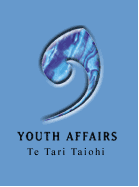
-
Youth Affairs
- The Ministry of Youth Affairs says that better income, work and education is critical if
New Zealand is to boost the development potential of young people. While today's young New
Zealanders are better educated than previous generations, young people have higher
unemployment rates than other groups.
The Youth Affairs briefing papers reveal that :
— a greater proportion of young people live in low-income households
— an even greater proportion of young Maori and Pacific Islands people (than the rate of young people) live in low-income households.
— research also shows that many young people who live in such households do so to supply income, rather than to be supported.
— those aged 20-24 who are employed are more likely than any other age group to earn the adult minimum wage ($7 per hour)
— 16-19 year olds have a youth minimum wage of $4.20
— young people aged under 18 are not benefit eligible except for a small number who receive the Independent Youth Benefit
— young people aged over 18 who receive benefits are more likely than other age groups to be on the lowest rate (that of a single person).
— Between 1986 and 1996, the median young person's income decreased by nearly 45%. The figures: the median annual income of 15 to 25-year-olds has fallen from $14,700 in 1986 to $8,100 in 1996.
— youth suicide rates have been increasing since 1984, and New Zealand has the second highest youth suicide rate in the OECD after Finland.Reaction: Youth Affairs Minister Laila Harré says that youth are becoming marginalised in low-paid jobs that offer little opportunity for skills development or advancement. Harré : "The focus has to be on improving the quality of these jobs and ensuring that education and training opportunities are available to all young people as soon as they leave school. It's my view that no one should be paid less for doing exactly the same work as someone working alongside them, even if that person is older "
Laila Harré says that the needs of young people are more complex than ever before and she wants to see a more co-ordinated approach to policy development for young people and the way policy is put in place.
Sources Ministry of Youth Affairs Briefing to Incoming Minister November 1999, available on the internet;
Press release from Ministry of Youth Affairs 21 January 2000 "Youth Affairs Briefing Papers Released"
The full version of this Briefing Paper to the Incoming Minister is available to the public on the internet.
type: Acrobat (.pdf) file
internet link: http://www.youthaffairs.govt.nz/pdf/bim2000.pdf

Top of Page
This Letter's Main Page
Stats | Subscribe | Index |
The Jobs Letter Home Page | The Website Home Page
jrt@jobsletter.org.nz
The Jobs Research Trust -- a not-for-profit Charitable Trust
constituted in 1994
We publish The Jobs Letter
— from the briefing papers
from The Jobs Letter No.115 / 17 January 2000







